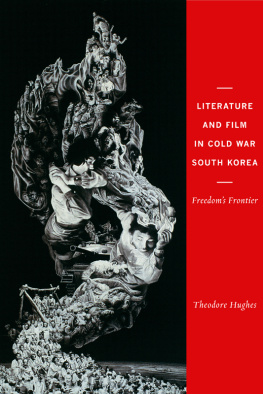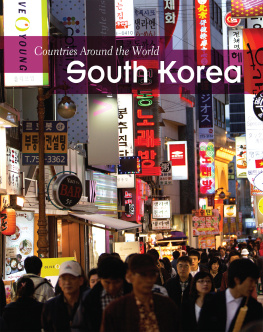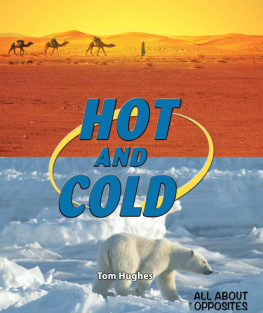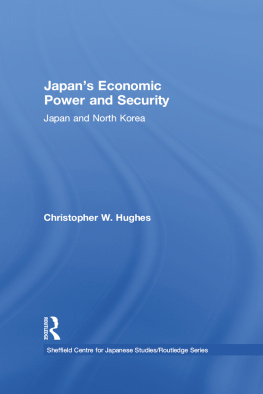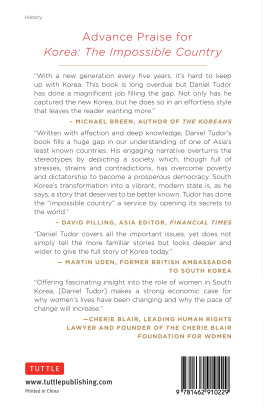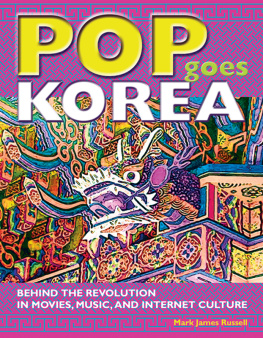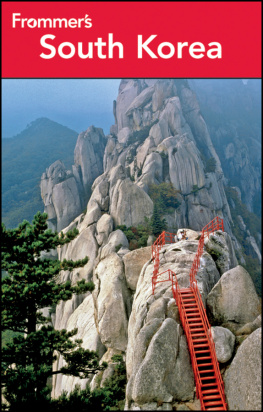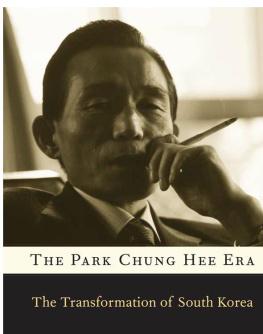COLUMBIA UNIVERSITY PRESS
Publishers Since 1893
NEW YORK CHICHESTER, WEST SUSSEX
cup.columbia.edu
Copyright 2012 Columbia University Press
All rights reserved
E-ISBN: 978-0-231-50071-5
Library of Congress Cataloging-in-Publication Data
Hughes, Theodore H.
Literature and film in Cold War South Korea : freedoms frontier / Theodore Hughes.
p. cm.
Includes bibliographical references and index.
ISBN 978-0-231-15748-3 (cloth: alk. paper) ISBN 978-0-231-50071-5 (e-book) 1. Korean literature20th centuryHistory and criticism. 2. Politics in literature. 3. Nationalism and literatureKorea (South) 4. Motion picturesKorea (South)20th centuryHistory and criticism. 5. Motion picturesPolitical aspectsKorea (South) 6. Politics in motion pictures. I. Title.
PL957.5.P64H64 2012
895.7093581dc23
2011030288
A Columbia University Press E-book.
CUP would be pleased to hear about your reading experience with this e-book at .
References to websites (URLs) were accurate at the time of writing. Neither the author nor Columbia University Press is responsible for URLs that may have expired or changed since the manuscript was prepared.
MORE PEOPLE THAN I can mention by name here have given me support and encouragement since my days in graduate school. without their kindness, generosity, and advice, I could not have written this book.
I would first like to express my sincere thanks to all of my teachers at UCLA. I am grateful most of all to John Duncan for his guidance and mentorship over the years. He opened up the richness and complexity of Korean history for me, and his critical engagement with my work has always motivated me to try to see things in new ways. Michael Bourdaghs and Seiji Lippit provided me with the tools to think about Korean culture and literature in a broader, comparative context. Ali Behdad, Robert Buswell, Katherine King, Gi-Wook Shin, and Samuel Weber all contributed to the directions my research took in graduate school and beyond.
My colleagues in the Department of East Asian Languages and Cultures and the Program in Comparative and World Literature at the University of Illinois at Urbana-Champaign made my years there truly rich and rewarding. Nancy Abelmann is one of the most inspiring people I have ever met. I am particularly thankful to her for reading a draft of the manuscript and offering insightful suggestions for its improvement. I would also like to thank Nancy Blake, the late David Goodman, Makoto Hayashi, Brian Ruppert, Simona Sawhney, and Ron Toby.
I am very grateful to all of my colleagues in the Department of East Asian Languages and Cultures and the Weatherhead East Asian Institute at Columbia for providing a wonderful community within which to learn, teach, and write. I would like to particularly thank Paul Anderer, Charles Armstrong, Carol Gluck, Robert Hymes, Dorothy Ko, David Lurie, Shang Wei, and Haruo Shirane for all of the advice and encouragement they have given me over the years. Whenever I turned to the late Ja Hyun Kim Haboush, she was always ready with kind words of counsel tempered with her quiet sense of humor. Lydia Liu and Tomi Suzuki read my manuscript and gave key comments at different stages of the revision process.
So many colleagues and friends in the growing community of Korean studies and others in Asian studies have given me much-needed advice and support. I owe a debt that cannot be repaid to Paek Sang-gi of Kyungnam University for introducing me to the world of modern Korean literature during my years as an English teacher in the early 1990s. Kwon Youngmin took me under his wing during my time at Seoul National University. His lectures provided me with an understanding of Korean literary history that continues to guide my research and teaching. Kyeong-Hee Choi generously read a portion of the manuscript and gave thoughtful comments and advice. I would also particularly like to thank Jinsoo An, Baek Moon Im, Ruth Barraclough, Hyaeweol Choi, Steve Chung, Henry Em, John Frankl, Tak Fujitani, Bruce Fulton, Han Man-su, Hwang Jongyon, Kelly Jeong, Jennifer Jung-Kim, Chong Bum Kim, Kim Chul, Kyu Hyun Kim, Kim Jaeyong, Jongmyung Kim, Michael Kim, Suk-Young Kim, Sun Joo Kim, Ross King, Kwon Boduerae, Lee Kyung Hoon, Namhee Lee, Lee Sang-kyung, Walter K. Lew, John Lie, Lim Jie-hyun, David McCann, Paik Won-Dam, Chan Park, Sunyoung Park, Pori Park, Janet Poole, Michael Robinson, Andre Schmid, Shin Hyung Ki, Jiwon Shin, Jesook Song, Clark Sorensen, Serk-Bae Suh, Vladimir Tikhonov, Atsuko Ueda, Naoki Watanabe, and Jun Yoo. I have also benefited immensely from interactions with undergraduate and graduate students at Illinois and Columbia over the years.
The dissertation research that led to this book was funded by the Korea Foundation, Fulbright IIE, and a UCLA Chancellors Dissertation Grant. Further research and writing were made possible by a fellowship from the Academy of Korean Studies and a Columbia University Summer Research Grant. The Northeast Asia Council of the Association for Asian Studies and the Sunshik Min Endowment administered by Harvard University provided generous publication subventions.
I am deeply grateful to Jennifer Crewe, the editor at Columbia University Press, for her interest in this project and for her guidance and advice from start to finish. It was truly a pleasure to work with Asya Graf, Chang Jae Lee, Michael Haskell, and Rob Fellman. I would like to thank two anonymous readers of the manuscript for their detailed and incisive comments.
My family has been a constant source of encouragement along the way. I would like to express my gratitude to my father, John Hughes; my partner, Jin-kyung Lee; my father-in-law, Myung-Jae Lee; my mother-in-law, Hwa-Suh Park; and my brothers, Terry, Tim, and Chris. Jin-kyung Lee read the manuscript at an important stage in the revision process and gave crucial advice. My mother, Sally Ann Quinby Hughes, did not live to see me accepted to graduate school, but she has always been with me in spirit.
THE END OF the Greater East Asian and Pacific War in 1945 brought about a new geopolitics. In Asia, this meant that the formerly colonized or semicolonized states (China, Korea, Taiwan, Vietnam) would now have to address the emerging U.S./Soviet bifurcation. Relations with these new Cold War powers often took the form of simultaneous alignment and contestation coupled with different degrees of subordination. The post-1945 U.S. occupation of South Korea, along with that of Japan, can be thought of in terms of a closing off of borders. The U.S./Soviet enforcement of division was accompanied by the removal of Korea from its former semiperipheral location in the Japanese empire, which meant, among other things, the cutting off of South Koreans both from the Manchurian periphery and the former Japanese metropole (in the form both of travel restrictions and a ban on Japanese cultural products and language). In Japan and Korea, this reordering signaled less of a break than a shift: the beginnings of a move away from wartime mobilization in the name of pan-Asia toward the mobilization cultures of the Cold War nation-state, in Japans case from the position of empire, in Koreas case from the position of colony.


